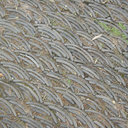Diterpene ginkgolides protect against cerebral ischemia/reperfusion damage in rats by activating Nrf2 and CREB through PI3K/Akt signaling.
الكلمات الدالة
نبذة مختصرة
Diterpene ginkgolides meglumine injection (DGMI) is a therapeutic extract of Ginkgo biloba L, which has been used for the treatment of cerebral ischemic stroke in China. Ginkgolides A, B and C are the main components of DGMI. This study was designed to investigate the neuroprotective effects of DGMI components against ischemic stroke in vivo and in vitro. Acute cerebral ischemic injury was induced in rats by occlusion of the middle cerebral artery (MCA) for 1.5 h followed by 24 h reperfusion. The rats were treated with DGMI (1, 3 and 10 mg/kg, iv) at the onset of reperfusion and 12 h after reperfusion. Administration of DGMI significantly decreased rat neurological deficit scores, reduced brain infarct volume, and induced protein kinase B (Akt) phosphorylation, which prompted the nuclear translocation of nuclear factor-erythroid 2-related factor 2 (Nrf2) and phosphorylation of the survival regulatory protein cyclic AMP-responsive element binding protein (CREB). Nrf2 activation led to expression of the downstream protein heme oxygenase-1 (HO-1). In addition, PC12 cells were subjected to oxygen-glucose deprivation/reperfusion (OGD/R) in vitro, treatment with DGMI (1, 10 and 20 μg/mL) or ginkgolides A, B or C (10 μmol/L for each) significantly reduced PC12 cell death and increased phosphorylation of Akt, nuclear translocation of Nrf2 and activation of CREB. Activation of Nrf2 and CREB could be reversed by co-treatment with a phosphoinositide-3-kinase (PI3K) inhibitor LY294002. These observations suggest that ginkgolides act as novel extrinsic regulators activating both Akt/Nrf2 and Akt/CREB signaling pathways, protecting against cerebral ischemia/reperfusion (I/R) damage in vivo and in vitro.




